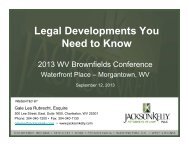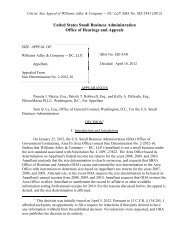clicking here - Jackson Kelly PLLC
clicking here - Jackson Kelly PLLC
clicking here - Jackson Kelly PLLC
You also want an ePaper? Increase the reach of your titles
YUMPU automatically turns print PDFs into web optimized ePapers that Google loves.
A PIAA PUBLICATION FOR THE MEDICAL PROFESSIONAL LIABILITY INSURANCE INDUSTRY • 2011 SECOND QUARTER<br />
physicianinsurer<br />
Physician<br />
Exodus—<br />
Can MPL<br />
Carriers<br />
Adapt<br />
A N D<br />
Options for<br />
fixed-income<br />
investments
BY THOMAS J. HURNEY, JR.,<br />
ROB J. ALIFF, AND<br />
RYAN E. VOELKER<br />
Case and<br />
Comment<br />
Thomas J. Hurney, Jr.<br />
Rob J. Aliff<br />
Shopping for a Litigation<br />
Home: Eating Away at the<br />
“Borrowing” Statute<br />
Ryan E. Voelker<br />
including a bowel resection surgery to<br />
address certain complications arising from<br />
the original tubal ligation procedure.<br />
She filed suit in West Virginia, and Dr.<br />
Bracken filed a summary judgment<br />
motion asking that the case be dismissed.<br />
Dr. Bracken argued that the complaint was<br />
barred under Ohio’s one-year statute of<br />
limitations based on Ohio Rev. Code Ann.<br />
§ 2305.11.3(A) (2003) (Repl. Vol. 2010).<br />
Relying on West Virginia’s “borrowing”<br />
statute, Dr. Bracken argued that Ohio’s<br />
shorter one-year statute of limitations<br />
applied instead of West Virginia’s two-year<br />
statute of limitations. The circuit court<br />
found that the action “accrued” in West<br />
Virginia, but sent the “application of the<br />
borrowing statute” question to the<br />
Supreme Court of Appeals of West<br />
Virginia. The Court accepted the certification<br />
to answer the<br />
following question:<br />
Forum shopping, motivated by a<br />
desire to file a lawsuit in a favorable<br />
jurisdiction, takes many<br />
forms, one of which is the desire<br />
to avoid unfavorable statutes of limitation<br />
in a natural forum. Many states have so<br />
called “borrowing statutes,” which<br />
attempt to prohibit forum shopping and<br />
require that the lawsuit remain in the<br />
jurisdiction w<strong>here</strong> it belongs.<br />
The law addressing this issue in West<br />
Virginia, Code § 55-2A-2, states: “[t]he<br />
period of limitation applicable to a claim<br />
accruing outside of this State shall be<br />
either that prescribed by the law of the<br />
place w<strong>here</strong> the claim accrued or by the<br />
law of this State, whichever bars the<br />
claim.” In short, the statute is intended to<br />
prevent a plaintiff from filing suit in West<br />
Virginia to avoid the shorter statute of<br />
limitations in another state. In essence,<br />
when an injury occurs in another state,<br />
and is barred by that state’s statute of limitations,<br />
the longer two-year West Virginia<br />
statute will not “save” the action . . . or so<br />
it appears.<br />
Thomas J. Hurney, Jr., and Rob J. Aliff<br />
are Members, and Ryan E. Voelker is an<br />
Associate, with <strong>Jackson</strong> <strong>Kelly</strong> <strong>PLLC</strong>.<br />
Willey v.<br />
Bracken<br />
A recent West<br />
Virginia case,<br />
Willey v. Bracken,<br />
--- S.E.2d ----,<br />
2010 WL 4025599<br />
(2010), turns the<br />
borrowing statute<br />
on its ear: the<br />
Supreme Court of<br />
Appeals found that it did not have to follow<br />
W. Va. Code § 55-2A-2 based on the<br />
“unique” facts before it. Willey was a<br />
medical professional liability case; however,<br />
it may very well have implications in<br />
a broader context. The Court essentially<br />
recognized that medical treatment in<br />
West Virginia for injuries caused by treatment<br />
occurring in another state permitted<br />
the application of West Virginia’s<br />
longer statute of limitations, despite the<br />
language of the borrowing statute.<br />
Mrs. Willey, a West Virginia resident,<br />
claimed that Dr. Bracken committed malpractice<br />
during a tubal ligation procedure<br />
performed in Ohio. Dr. Bracken practiced<br />
in both Ohio and West Virginia. Mrs. Willey<br />
subsequently returned to West Virginia for<br />
medical treatment by other physicians,<br />
When a surgical<br />
procedure is negligently<br />
performed in<br />
a foreign jurisdiction,<br />
and as a direct<br />
result of that negligence<br />
the<br />
plaintiff/patient<br />
must undergo a<br />
subsequent surgical<br />
procedure in<br />
West Virginia, does the West Virginia borrowing<br />
statute, W. Va. Code § 55-2A-2<br />
(1959) (Repl. Vol. 2008), apply<br />
The parties argued that the “accrual”<br />
of the cause of action dictated the applicable<br />
statute of limitations. Dr. Bracken<br />
argued the action accrued in Ohio, w<strong>here</strong><br />
the negligent act, the surgery, occurred;<br />
thus, the action was barred by Ohio’s<br />
one-year statute of limitations. Mrs.<br />
Willey argued the action accrued w<strong>here</strong><br />
the injury—the subsequent treatment—<br />
occurred, which was in West Virginia,<br />
with a two-year statute of limitations.<br />
The court’s response<br />
The Court rejected both arguments,<br />
Continued on page 14<br />
12 P H Y S I C I A N I N S U R E R S E C O N D Q UARTER 2011
C ASE AND C OMMENT<br />
Continued from page 12<br />
finding that:<br />
“[F]rom the allegations in the complaint, it<br />
is clear that at least part of the cause of<br />
action accrued in the State of Ohio. If the<br />
complaint in this matter rested solely upon<br />
damages resulting from the injury caused in<br />
Ohio, this Court would not hesitate to find<br />
that the borrowing statute applies. See W.<br />
Va. Code § 55-7B-4 (1986) (Repl. Vol. 2008)<br />
(“A cause of action for injury to a person<br />
alleging medical professional liability<br />
against a healthcare provider arises as of<br />
the date of injury.”). See also Syl. pt. 1, Jones<br />
v. Trustees of Bethany College, 177 W. Va.<br />
168, 351 S.E.2d 183 (1986) (“The statute of<br />
limitations ordinarily begins to run when<br />
the right to bring an action for personal<br />
injuries accrues[,] which is when the injury<br />
is inflicted.”). However, as will be shown, the<br />
complaint in this case also seeks relief for<br />
harm caused in the state of West Virginia.<br />
Ultimately, the unique facts of this case<br />
demand that, as a matter of public policy,<br />
the mere fact that an injury occurred<br />
The record in this<br />
case indicates that<br />
Mrs. Willey had to<br />
undergo corrective<br />
surgery in West<br />
Virginia as a direct<br />
result of the alleged<br />
negligence of Dr.<br />
Bracken.<br />
in another jurisdiction will not automatically<br />
invoke the borrowing statute<br />
w<strong>here</strong> additional injury occurs in West<br />
Virginia. (Emphasis added.)<br />
The Court relied heavily on the<br />
“Certain Remedy Clause” of the West<br />
Virginia Constitution, W. Va. Const. Art.<br />
III, § 17, as establishing public policy<br />
against denying West Virginia citizens the<br />
“right to redress in the courts of this State<br />
for injuries received in West Virginia.”<br />
The Court also relied on the West Virginia<br />
forum non conveniens statute, W. Va. Code<br />
§ 56-1-1a, as additional support that<br />
public policy favors the concept that West<br />
Virginia citizens have remedy, in West<br />
Virginia, for their injuries: “The forum<br />
non conveniens statute allows an action<br />
to proceed in a West Virginia court when<br />
the action would be barred by the statute<br />
of limitations in a foreign court, unless<br />
the defendant agrees to waive the right to<br />
assert the statute of limitations defense in<br />
the alternative forum.” On the facts<br />
before it, then, the Court concluded:<br />
The record in this case indicates that Mrs.<br />
Willey had to undergo corrective surgery<br />
in West Virginia as a direct result of the<br />
alleged negligence of Dr. Bracken. By virtue<br />
of the emergency surgeries to correct her<br />
ruptured sigmoid colon, Mrs. Willey was<br />
subjected to additional invasions of her<br />
body, which caused her to sustain pain,<br />
suffering, and economic loss in West<br />
Virginia that was directly caused by the<br />
Huggins®<br />
Actuarial Services, Inc.<br />
Rusty T. Kuehn FCAS MAAA CPCU ARM FCA<br />
Maureen S. Donnelly ACAS MAAA<br />
Todd H. Dashoff ACAS MAAA ARM<br />
Conrad Membrino ACAS<br />
Rhonda Hellman ACAS MAAA<br />
Steve Lesser FCAS MAAA<br />
Alan M. Pakula ACAS MAAA<br />
Jane C. Taylor FCAS MAAA JD<br />
Melissa Houck ACAS MBA<br />
Blaine Marles FCAS MAAA<br />
Kim E. Piersol FCAS MAAA<br />
Huggins Actuarial Services, Inc.<br />
111 Veterans Square<br />
Media, PA 19063<br />
(610) 892-1824<br />
www.hugginsactuarial.com<br />
14 P H Y S I C I A N I N S U R E R S E C O N D Q UARTER 2011
alleged negligence of Dr. Bracken in Ohio.<br />
The Court, citing Webb v. Smith, 276<br />
Va. 305, 661 S.E.2d 457 (2008), indicated<br />
that because Mrs. Willey exercised her<br />
right to seek damages for all of the<br />
injuries caused by Dr. Bracken, from the<br />
initial surgery as well as her subsequent<br />
remedial surgeries, “the public policy of<br />
this State demands that [she] be allowed<br />
to seek full redress, not partial redress, in<br />
a West Virginia court.” The Court issued<br />
a new syllabus point (which, in West<br />
Virginia, is the binding precedent of the<br />
opinion), which states:<br />
By virtue of the<br />
emergency surgeries<br />
to correct her<br />
ruptured sigmoid<br />
colon, Mrs. Willey<br />
was subjected to<br />
additional invasions<br />
of her body.<br />
When a cause of action is filed in a West<br />
Virginia court seeking damages for a surgical<br />
procedure that was negligently performed<br />
in a foreign jurisdiction, along with<br />
damages for a subsequent surgical procedure<br />
performed in West Virginia as a<br />
direct result of the negligence in the foreign<br />
jurisdiction, public policy demands<br />
that the applicable West Virginia statute of<br />
limitations applies to the negligence committed<br />
in the foreign jurisdiction. Under these<br />
unique circumstances, the West Virginia borrowing<br />
statute, W. Va. Code § 55-2A-2<br />
(1959) (Repl. Vol. 2008), has no application.<br />
T<strong>here</strong> is no doubt that Mrs. Willey’s<br />
suit was barred by the one-year statute of<br />
limitations in Ohio. Because she alleged<br />
as damages surgical procedures that<br />
occurred in West Virginia, the Court,<br />
using “public policy,” avoided the application<br />
of the borrowing statute. While this<br />
particular case is limited to its facts, it<br />
certainly suggests that a West Virginia<br />
resident claiming medical negligence in<br />
another state can avoid unfavorable foreign<br />
statutes by bringing suit in West<br />
Virginia. As long as the treatment for the<br />
injuries caused is provided in West<br />
Virginia, the plaintiff can invoke the<br />
longer statute of limitations (assuming<br />
jurisdiction over the defendant).<br />
Perhaps the Court was influenced by<br />
the fact the doctor practiced in West<br />
Virginia and the surgery occurred just<br />
across the border in Ohio. Regardless,<br />
while Willey is limited to the unique facts<br />
before it, those facts, when examined, are<br />
not all that unique, in that it is certainly<br />
not uncommon that patients may seek<br />
medical treatment in different jurisdictions<br />
from time to time. Under the<br />
analysis of this case, one may have<br />
options when<br />
choosing their<br />
“litigation<br />
home.”<br />
For related information,<br />
see www.jacksonkelly.<br />
com.<br />
S E C O N D Q U A R T E R 2011 P H Y S I C I A N I N S U R E R 15





